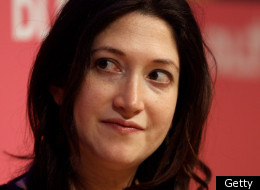Megha
New member
[lang=en]

Randi Zuckerberg, Facebook’s marketing director, has a fix for cyberbullying: stop people from doing anything online without their names attached.
Facebook requires all members to use their real names and email addresses when joining the social network -- a policy that has been difficult at times to enforce, as the prevalence of spam accounts or profiles assigned to people’s pets suggest.
Zuckerberg, who is Facebook co-founder Mark Zuckerberg’s sister, argued that putting an end to anonymity online could help curb bullying and harassment on the web.
“I think anonymity on the Internet has to go away,” she said during a panel discussion on social media hosted Tuesday evening by Marie Claire magazine. “People behave a lot better when they have their real names down. … I think people hide behind anonymity and they feel like they can say whatever they want behind closed doors.”
Former Google CEO Eric Schmidt has also made this suggestion, calling online anonymity “dangerous” and predicting that governments will eventually “demand” that people use their names for all online activity.
But the proposal to tie real-world identities to online actions is a controversial one, with many privacy and free speech advocates countering that anonymity is necessary to protect dissidents and other individuals, such as sexual abuse victims.
Gigaom’s Matthew Ingram wrote recently, “Many people believe that requiring real names will solve the problems of trolls and bad behavior, but they don’t -- and that policy can have negative consequences in terms of suppressing dialogue about important topics.”
Story continues below
Advertisement
Though pressed several times to name what new features Facebook will offer to better safeguard security on the social networking site, Zuckerberg declined to offer specific examples of forthcoming initiatives.
“There's so much more we can do,” she said. “We’re actively tying to work with partners like Common Sense Media and our safety advisory committee.”
Erin Andrews, an ESPN anchor who had a naked video of her posted online by a stalker, joined Zuckerberg as a panelist and addressed her struggles to have the illegally-obtained video removed from the web. She became emotional at points during the conversation and described her frustration working Google and other companies that declined to pull the video from the websites hosting it.
Andrews praised Google for its “remarkable” contribution to the campaign against bullying titled "It gets better," but noted she also found it inconsistent: Google searches for her name still turn up the images and videos posted by her stalker, even as the search giant professes to be taking a stand against online harassment.
“So when does it get better? I’m confused,” said Andrews, who suggested that her situation may have been viewed differently because it involves a “woman in her 30s.” “It’s still cyberbullying. Somebody needs to step in. As a family we're always asking, what is it going to take?”[/lang]
dari huffingtonpost.com

Randi Zuckerberg, Facebook’s marketing director, has a fix for cyberbullying: stop people from doing anything online without their names attached.
Facebook requires all members to use their real names and email addresses when joining the social network -- a policy that has been difficult at times to enforce, as the prevalence of spam accounts or profiles assigned to people’s pets suggest.
Zuckerberg, who is Facebook co-founder Mark Zuckerberg’s sister, argued that putting an end to anonymity online could help curb bullying and harassment on the web.
“I think anonymity on the Internet has to go away,” she said during a panel discussion on social media hosted Tuesday evening by Marie Claire magazine. “People behave a lot better when they have their real names down. … I think people hide behind anonymity and they feel like they can say whatever they want behind closed doors.”
Former Google CEO Eric Schmidt has also made this suggestion, calling online anonymity “dangerous” and predicting that governments will eventually “demand” that people use their names for all online activity.
But the proposal to tie real-world identities to online actions is a controversial one, with many privacy and free speech advocates countering that anonymity is necessary to protect dissidents and other individuals, such as sexual abuse victims.
Gigaom’s Matthew Ingram wrote recently, “Many people believe that requiring real names will solve the problems of trolls and bad behavior, but they don’t -- and that policy can have negative consequences in terms of suppressing dialogue about important topics.”
Story continues below
Advertisement
Though pressed several times to name what new features Facebook will offer to better safeguard security on the social networking site, Zuckerberg declined to offer specific examples of forthcoming initiatives.
“There's so much more we can do,” she said. “We’re actively tying to work with partners like Common Sense Media and our safety advisory committee.”
Erin Andrews, an ESPN anchor who had a naked video of her posted online by a stalker, joined Zuckerberg as a panelist and addressed her struggles to have the illegally-obtained video removed from the web. She became emotional at points during the conversation and described her frustration working Google and other companies that declined to pull the video from the websites hosting it.
Andrews praised Google for its “remarkable” contribution to the campaign against bullying titled "It gets better," but noted she also found it inconsistent: Google searches for her name still turn up the images and videos posted by her stalker, even as the search giant professes to be taking a stand against online harassment.
“So when does it get better? I’m confused,” said Andrews, who suggested that her situation may have been viewed differently because it involves a “woman in her 30s.” “It’s still cyberbullying. Somebody needs to step in. As a family we're always asking, what is it going to take?”[/lang]
dari huffingtonpost.com

